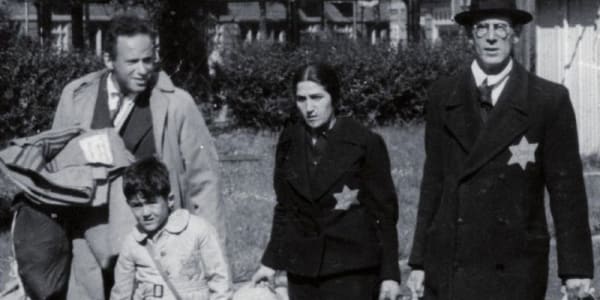Learn more about ActiveChristianity, or explore our theme pages for more

Contemporary lessons from the example of the yellow star
Fundamental human rights can be used to undermine each other if we forget lessons from our history.

In the years 1941/1942, a dehumanizing measure was passed in Germany and in most of Germany’s occupied territories: the mandatory wearing and display of the yellow star (or the “Jewish badge”) for the Jewish part of the population.
Remembering and thinking about measures like this has a message for our contemporary reality. Because it is not at all a matter of course, even in all democratic countries, that there is a healthy and respectful balance between fundamental human rights such as freedom of expression, religious freedom, and the prohibition of discrimination.
A sliding scale
People who are in their 80s or 90s today tell striking stories about what they experienced under the Nazi regime. Many people, most of them well-meaning, “just stood there and looked on.” And how easy it is to say, “I really wouldn’t have done that!” in hindsight. That’s why it’s so important to remember and think about the fact that such a thing could happen. It did not start with the yellow star, and even less with the gas chambers! Discrimination begins with prejudice. Prejudice, based mainly on feelings and hardly or not at all on relevant facts. Prejudice, often from a group that feels strong or superior in relation to an individual or a minority. Someone once used the term “prejudice ladder.” If the bias is not removed, people end up on a sliding scale that can ultimately lead to discrimination and, in the horrific example of World War II, to the systematic murder of discriminated people.
Like what you’re reading?
Fundamental rights at odds with each other
Hopefully, everybody in a healthy democratic country wants people to be able to grow up in peace, without any kind of discrimination, and with the space to make their own choices and to have their own opinions, and to be able to express them. And with the right to confess and practice their religion or convictions, as individuals or together with others.
So why is having a reality with a healthy balance between freedom of expression, freedom of religion, and the prohibition of discrimination so far from being self-evident? Even more to the point: why are these gains regularly at odds with each other in our contemporary society?
When does it go wrong?
Things go wrong when people cannot accept that other people have a different religion, conviction, political view, race, gender, or whatever. Things go wrong when freedom of expression is abused and slips into openly attacking and denigrating and eventually discriminating against others. In most countries freedom of expression, freedom of the press and prohibition of discrimination are regulated by law. Things go wrong when the letter of the law is the only guideline and when, based on this, people try to find the limits of what is legally permissible. For example, how far they can go under the denominator of freedom of expression, instead of primarily thinking and acting out of respect and love for their fellow human beings. Not least, this applies to the Christian point of view, where respect for each individual’s free will is so fundamental.
Important to recognize the early stages
Just standing by when the yellow badge was imposed on the Jews was abominable and shameful. It can be extremely significant when it concerns political or religious beliefs, race and orientation today. And then it is especially important that lessons learned from the past can help us meet the challenges of the present. Religious and political extremism have led to the greatest crimes in human history, but even the much less brutal beginnings of such developments are very undesirable and threatening. That is why it is so important to recognize those inconspicuous, much less coarse starting stages.
A Christian profile gives others space
Christians in a healthy democracy may also choose a conviction and a profile, just like hundreds of other political and social groups. And they have the right to live according to that Christian profile without being prosecuted or discriminated against. And it is very emphatically part of a Christian conviction and profile to give others freedom and room to make other choices, and to have a different conviction and also to disagree with this Christian conviction and profile. So there is lasting room for pluralism. Obviously within the legal framework, but above all with and out of respect for and love for our fellow man, regardless of their religion, beliefs, political views, race, sex, or otherwise. Room where there is no place for prejudice and contempt, and absolutely no place for discrimination and being discriminated against. Remembering and thinking about the yellow badge that was imposed 75 years ago is also relevant and necessary in 2017.
Scripture taken from the New King James Version®, unless otherwise specified. Copyright © 1982 by Thomas Nelson. Used by permission. All rights reserved.



